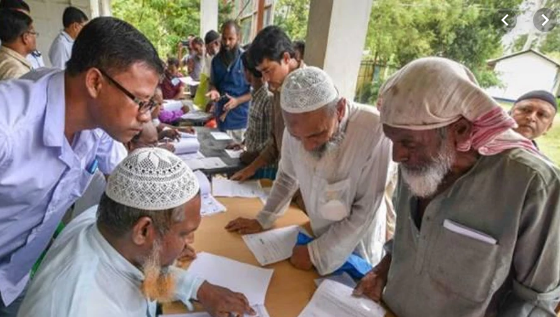
After stressful two years, the final list of the National Register of Citizens (NRC) in Assam has been published. There have been suicides allegedly owing to the fear of exclusion. The Bharatiya Janata Party (BJP) has gone from using the NRC as a divisive political tool to treating it as a hot potato. Such a scenario should make it clear to everybody that the NRC was a pointless exercise whose only purpose was to prove a political point, i.e. if at any point of time there were illegal immigrants in Assam, they do not exist anymore.
It was in 1998 that late Lieutenant General SK Sinha who was then the Governor of Assam wrote that as per a report in India Today, there were 4 million illegal migrants living in Assam. The final exclusion list has proved this figure to be quite false. Around 19 lakh names have been excluded and as the process has been monitored by the Supreme Court, it is most likely that the numbers will fall in the succeeding decade. This is because there will be opportunities to be heard. Those excluded will receive a summons from the dreaded Foreigners Tribunals (FT). Further, any adverse orders received in the FTs will as usual be subject to appeals and challenges in the High Court and then the Supreme Court. The biggest concern will be the legal fees and time taken for innumerable court appearances.
The BJP’s change of position too is expected. Rather than what was and has been touted as an exercise targeting the Bengali-speaking Muslim community of the state has instead left many Bengali-speaking Hindus off the list, i.e. the BJP’s target vote base. Such a situation has become quite the embarrassment for the saffron party, particularly when they realised the political suicide of pushing for the Citizenship Amendment Bill (CAB). It has now become a situation where the BJP is busy trying to discredit the entire NRC and perhaps in the near future revive the CAB if rescuing their voters left off the list does not appear possible.
Yet the BJP’s cynical gameplan of discrediting a Supreme Court-monitored process has the potential to plunge Assam back into chaos. The purpose of the NRC was to put to rest a debate that had seen some of the worst excesses committed in its name, the insider-outsider issue. A tenuous peace was brokered between communities in the 1990s while the security forces were hunting down the United Liberation Front of Assam (ULFA). Ironically, the present head of the anti-talks faction, Paresh Barua in an interview given to The Week had criticised the NRC process while it was still underway primarily because he felt that it would end up dividing Assamese society. It would thus appear that those battling the Indian State have a more progressive outlook than many of those involved in party politics.
At this point, it would appear that Assam will be able to heal and move forward only by accepting the outcome of the citizenship exercise and extending legal aid to those left out. Irrespective of religious affiliation, those seeking to gain political mileage out of the exercise are unlikely to let the matter reach its final conclusion. This may work well in electoral politics, but a state that has seen horrendous violence committed in furtherance of these agendas does not deserve to revisit the dark days of the last two decades of the 20th Century.




